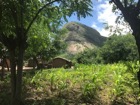Gift Masala, Bridget Masanche, and Masiye Mazalale describe their experiences collecting data in rural Malawi.
The three of us – Gift Masala, Bridget Masanche and Masiye Mazalale – were field supervisors and a data collector on a Drivers of Food Choice (DFC) project in rural Malawi. The project is titled: ‘Do agricultural input subsidies on staples reduce dietary diversity?’ It aimed to assess the impact of Malawi’s Farm Input Subsidy Programme (FISP) on food choice and dietary diversity. This blog post outlines the experiences that we had during the fieldwork for this project.

We all have fieldwork experience. For example, Gift has worked on other health-related research projects such as rapid mortality monitoring assessment and pregnancy history surveys. Bridget has worked on projects like the Malawi Education School Improvement survey. Masiye has worked on projects like assessing the impact of performance based financing on maternal care and violence against women and children.
The first round of fieldwork for the DFC study was conducted in May 2017, and the second round in February 2018. Each time, the fieldwork was preceeded by five days of data collector training at Chancellor College in Zomba. The training involved discussing research ethics, discussing the study questionnaire, translating the questionnaire, conducting mock interviews, and a pilot in the villages close to Zomba. During the training we helped to make the study tools more relevant to the Malawian context. For example, there was discussion of ‘clear broth’. Many of us felt it is not common in the villages, so it was replaced by ‘soup from relish’. To ensure standardisation when obtaining quantities of foods, it was agreed that our own study cups (a small and large version) would be used when getting information from respondents. The different sized cups helped to account for the different quantities of foods purchased
In the second round of fieldwork (Febraury 2018) we also conducted a discrete choice experiment, which during the training session we helped to develop and pilot. This involved hypothetical baskets of food, and asking respondents to choose their preferred basket (out of 3) in 10 different scenarios. The baskets were valued between 900 and 1100 Malawi Kwacha and contained varous amounts of maize, rice, dried fish, cabbage and a soft drink. To present this we developed pictures of the food items, and had extended discussion about which brand of soft drink should be in the picture. We chose Frozy, which is the most commonly consumed soft drink in the rural area
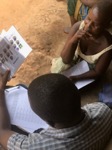
Our data collectors were split into two teams. Bridget’s team went to Lilongwe in the central region of Malawi and Gift’s team went to Phalombe in the southern region. Before starting the fieldwork it is important to get approval to work in the area from the District Commissioner, and this was done on the arrival day in each region. The following day, we took the letters from the District Commissioners to the Traditional Authority (TA) we were working in – TA Chadza in Lilongwe and TA Mkhumba in Phalombe.
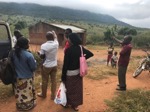
We selected households by locating the centre of the enumeration area (EA), and sending the data collectors off in different directions from that central place. The data collectors approached every fifth household that they encountered. If there was no one available at the selected household, we replaced the household with the next household. In each district and within each TA, interviews were done in four EAs. In two of the EAs we also conducted focus group discussions (one for women and another for men, separately), and in the other two we conducted key informant interviews with village heads.
We also conducted interviews with representatives of the District Councils – people such as the District Commissioner, the District Health Officer and District Agricultural Developmental Officer. It was easier to organise these interviews in Phalombe than in Lilongwe, which is also Malawi’s capital, a big city, and a place where we found people to be busy and often out of the office. Because of this, we conducted these interviews for Lilongwe in February 2018, during the second round of fieldwork.
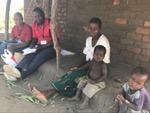
Each afternoon, after the research assistants had completed the interviews, Bridget and Gift, as the field supervisors, checked the questionnaires to ensure data quality. If there were any inconsistencies, the research assistant responsible for that particular questionnaire would return to the household for clarification. We enjoyed listening to the different ideas from the focus group discussions. People in the same EA would often have quite different experiences regarding the FISP, depending on the village they were living in. The key informant interviews worked well at district level, but some of the questions asked of village heads were difficult for these people to answer because of low literacy levels. The DCE needed some explaining, but after this the respondents were able to make their choices and often enjoyed the task.
We were presented with some challenges during the fieldwork. In one of the EAs in Phalombe, a funeral ceremony was held and so interviews were not conducted in that area. The team went to another EA instead. The people we interviewed were generally very warm and welcoming to us. However a few days into the fieldwork, one of the data collectors in Phalombe felt threatened by a person acting oddly who insisted on being interviewed. We reported this situation to the village head, who was able to appropriately intervene.
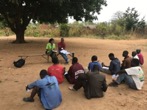
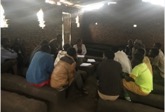
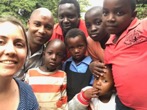
One of the study investigators, Helen Walls, joined us for some of the time we were in Phalombe in the first found of fieldwork, and in Lilongwe the second time. We enjoyed her contribution to the study. At one point there were a lot of village children spending time with those of us who had finished our interviews, and she taught us a game called ‘Piggy in the Middle’, which we played with a big group of children, using a readily available material – an empty drink bottle.
We enjoyed the scenery in the regions in which we were working, and learnt from the local people more about the regions. For the Lilongwe team this included ‘the rock with a mouth’, or ngala ya pakwamwa in Chichewa, the local langauge. The Phalombe team were close to the scenic Mulanje Mountain which is on the boundary of Phalombe and Mulanje Districts. In Phalombe, we learnt a lot from a man working in forestry who shared with us his knowledge of the different types of trees that are found on the mountain. He spoke a lot about cedar, which is a very expensive tree and well protected. Phalombe District is one of the biggest rice producers in Malawi, and the women in the Phalombe team learnt the local way of clearing rice from its stems and also of winnowing the rice. Overall, the work was very interesting and we managed to complete everything as planned.

